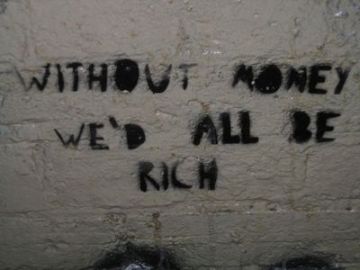Maybe it’s a different world from where I stand.
I was talking with a good friend of mine during my recent travels across the country. She had moved the spring before from northern Virginia and commented on my relocation as well. “You don’t belong there”. She expressed her own observation at the area’s uncanny ability to ruin good people. The longer good people live there the more ruined they become. And while the person is still there, the quality of that person—their ambition, character, vibrancy—is lessened. It’s as if they loose perspective of what really matters in life. I think it’s a way of living that at once assuages our need and poisons our minds. And really what I think it is, is money.
In northern Virginia money buys us the life, the style, and the status that we need. There is plenty of it too. Some of the richest counties in America are in northern Virginia. The culture is rich and so the possibilities of being rich are endless and the status game says we should pursue such an end at all cost.
The problems of a rich culture are two fold. First that it ties our perspective into being rich like everyone else. Suddenly our lives become about wealth, gaining wealth, and living wealthy instead of living well. And second, in amongst all of the wealthy ‘comfortable’ people we loose perspective of need and are, as they say, fat and happy, and unable to see reality outside of our comfortable wealth. We don’t need God or people we have comfort and so does everyone else.
Because of the outside social pressures to be rich and the inner comfort gained from being rich our hearts become desensitized to the voice and call of God which often leads us to suffering and sacrifice. The exchange is, of course, for his eternal kingdom lived out incarnationally here on the earth. But who needs that? We have three services on the weekend and enough electronic equipment to rival a small film studio! Who wants God’s kingdom here on earth when you can have that?
It’s easy to pick on the mega church model and say that they love money. Even the unsaved think they love money. But the truth is that other people don’t love money. The truth is that WE love money. You and I living the missional life love money and we know this by the way we attack anyone who tries to challenge us on tithing. The instinctual bitter rebellion is a symptom of our idolatry. We know it’s wrong, otherwise we wouldn’t be so emotional, but we deny it anyway. We come up with reasons for why we are justified. We have two children. We own a home. We give in so many other ways….the list goes on but really it’s just a list of excuses to let us keep our idol. Let us continue to love the money that keeps us safe and comfortable. Satan doesn’t have to attack us—He just has to bless us.
Like an inoculation, a culture of wealth assuages even the most passionate, such that over time the authority and power we held as sons and daughters of Christ is given up. We don’t need authority—we are happy being complacent in our money.
That’s why I think it’s a different world from where I stand.
Oh, trust me, I love money too. But from where I stand I see a life that is defined by more than my status or my income. I see a kingdom where God provides for his children’s daily bread—literally. And as I watch people sacrifice and live in poverty for the kingdom of God but still not go uncared for I want to leave my money behind. I set up an automatic debit for my tithe. I don’t want to miss a month of giving. I don’t want to be lazy—I want to be about the kingdom of God. And from where I stand, that’s worth more than giving my future children ‘everything I didn’t have’, or going on that great vacation every year.
I think this must be the real world however different it is from another perspective.
So here’s to giving up the spoiled, desensitized, life. I want to feel hunger if it means investing in the kingdom. I’m sure the investment is worth it. My hope is that you’ll join me.



